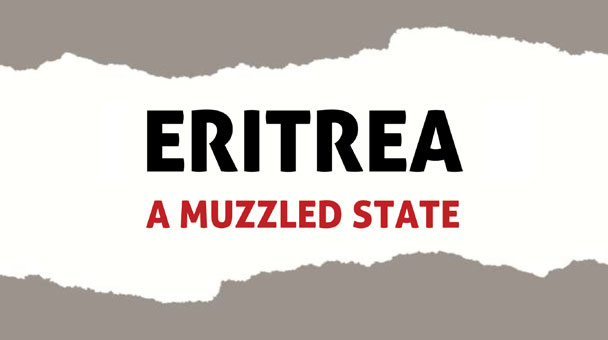
It has now been more than sixteen years since the appalling crackdown on the media in Eritrea, which saw twelve journalists arrested for their work. Years later, the whereabouts of the detained journalists remains unknown: tragically a number of them are believed to have died in prison, though their deaths have never been officially confirmed.
Eritrea continues to be one of the most restrictive countries in the world in terms of freedom of expression, and was once again ranked 179th of 180 countries on the 2018 World Press Freedom Index published by our colleague Reporters Without Borders:
Like everything else in Eritrea, the media are totally subject to the whim of President [Isaias Afewerki], a predator of press freedom who is responsible for 'crimes against humanity'.English PEN was honoured to host Eritrean human rights defender and writer Eyob Ghilazghy, the secretary of our sister centre PEN Eritrea, as our writer-in-residence here in London in 2017. During his time with us, Ghilazghy wrote a chilling report, 'Eritrea: a muzzled state', to bring the repression rife in his native Eritrea to the attention of the UK and the international community:
Eritrea is one of the least free countries in the world in terms of freedom of expression.... Even state-supported journalists and artists are being subjected to intimidation, harassment, detention and torture. Meanwhile, the regime’s spies closely monitor the exchange of information and communications. Any opinion, views, narratives and conversations that deviate from the government narrative can lead to the arrest, detention and torture of those involved. The government’s activities of surveillance, monitoring, threats and reprisals with the aim of silencing people of opposing views is not limited to people inside the country. Human rights organisations have to work together to influence global and regional policies and approaches towards the Eritrean regime with the aim of holding the current government accountable for the crimes it has committed against humanity.Read the full report here. Meanwhile our colleagues at PEN Eritrea, one of a number of PEN centres forced to operate in exile, continue to do incredible work to highlight the plight of their imprisoned colleagues. In April 2018, they joined PEN International in submitting a report on Eritrea to the African Commission on Human and Peoples’ Rights. PEN Eritrea's Executive Director Abraham T. Zere delivered a powerful testimony to the Tom Lantos Human Rights Commission of the United States Congress. Ahead of this year's World Press Freedom Day, English PEN pledges to continue to work closely with PEN Eritrea to call for the release of our imprisoned colleagues, to ensure that they are not forgotten. Please join us. TAKE ACTION Spread the word Share details of journalists imprisoned in Eritrea on Facebook, Twitter and other social media. Please consider tagging the Minister of Information Yemane Gebremeskel - @hawelti. #EritreasForgottenJournalists. Write to the authorities
- Protesting the detention of Dawit Isaak on politically motivated grounds and without known charges or trial since 2001;
- Urging the Eritrean authorities to immediately disclose the whereabouts of Dawit Isaak and other detained journalists and release them immediately and unconditionally;
- Expressing concern for Isaak’s health as detainees are believed to have suffered ill treatment, probably torture and lack of access to medical care, as highlighted by the reported deaths of some of the journalists.